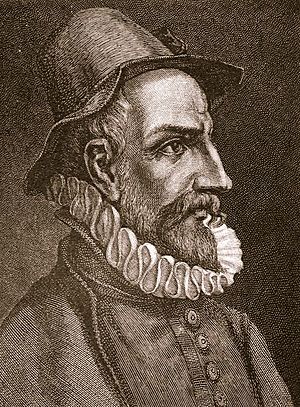Johann Fischart facts for kids
Johann Baptist Fischart (born around 1545 – died 1591) was a German writer known for his funny and sharp stories (called satires) and for writing about public matters (a publicist).
Contents
Early Life and Education
Johann Fischart was likely born in Strasbourg, a city in Germany, around the year 1545. Some people think he might have been born in Mainz. He grew up and studied in Worms with his cousin and teacher, Kaspar Scheid.
Fischart loved to travel! He explored countries like Italy, the Netherlands, France, and England. When he returned, he earned a law degree from a university in Basel.
His Work and Life
Most of Fischart's famous writings were created between 1575 and 1581. During this time, he lived and probably worked with his sister's husband, Bernhard Jobin. Jobin was a printer in Strasbourg and published many of Fischart's books.
In 1581, Fischart became a lawyer at a special court called the Reichskammergericht (which was like a high court of appeal) in Speyer. Two years later, in 1583, he got married and became a local official (called an Amtmann) in Forbach, near Saarbrücken. He passed away there in the winter of 1590 or 1591.
His Impact and Writing Style
For a while after he died, people almost forgot about Fischart's writings, even though they were very popular when he was alive. But later, writers like Johann Jakob Bodmer and Gotthold Ephraim Lessing helped bring his work back into public attention. By the late 1800s, people started studying his books seriously and understood how important he was in German literature.
Fischart was a very smart person. He studied old books and also writings from Italy, France, the Netherlands, and England. He was a lawyer, a religious thinker, and a satirist. He was also one of the most powerful Protestant writers during a time called the Counter-Reformation, when there was a lot of religious change.
What He Wrote About
Fischart was a big supporter of a republic, where people have a say in their government. He used his funny and sharp stories to criticize many things he thought were wrong in society. He made fun of:
- People who believed too much in astrology (predicting the future from stars).
- Teachers who were too focused on old, strict rules.
- People who were too proud of their family history.
- But most of all, he strongly criticized the Pope, the lives of priests, and the Jesuits (a religious group).
He used wild jokes, extreme caricature (making things look funny by exaggerating them), and clever wordplay to make his points. He did all of this with a serious goal: to make people think and improve society.
His Unique Writing Style
As a writer, Fischart was known for his powerful and vivid style. He used lots of descriptive words and symbolic language. He was very creative with the German language, often making up new words and phrases. Even when he made up words, he showed how smart and witty he was.
Famous Writings
Fischart sometimes wrote under different names, called pseudonyms. Some of these names were Mentzer, Reznem, and Ulrich Mansehr von Treubach. It's not always clear if every work believed to be his was truly written by him. However, we know for sure that he wrote more than 50 funny works, both in prose (like stories) and verse (like poems).
Key Books and Poems
Here are some of the works believed to be written by Johann Fischart:
- Nachtrab oder Nebelkräh (1570): A funny story against Jakob Rabe, who had changed his religion to Catholic.
- Von St. Dominici des Predigermönchs und St. Francisci Barfüssers artlichem Leben (1571): A poem that defended Protestants against false accusations.
- Eulenspiegel Reimensweis (published 1572): A rhyming version of the popular trickster tale.
- Flöh Haz, Weiber Traz (1573): This book describes a funny battle between fleas and women!
- Affentheuerliche und ungeheuerliche Geschichtschrift (1575): This was based on a famous French book by Rabelais.
- Das glückhafft Schiff von Zürich (The Lucky Ship of Zürich) (1576): This is a famous poem. It tells the story of some soldiers from Zürich who sailed all the way to Strasbourg in just one day. To prove their amazing feat, they brought a pot of warm millet gruel (a type of porridge) that had been cooked in Zürich. This story was meant to show that "perseverance overcomes all difficulties."
- Bienenkorb des heiligen römischen Immenschwarms (1579): This was a changed version of a Dutch book.
- Das vierhörnige Jesuiterhütlein (1580): A rhyming satire that made fun of the Jesuits.
He also wrote many shorter poems. Some religious songs and psalms in a Strasbourg hymn-book from 1576 are also thought to be his.
See also
 In Spanish: Johann Fischart para niños
In Spanish: Johann Fischart para niños
 | Aurelia Browder |
 | Nannie Helen Burroughs |
 | Michelle Alexander |


